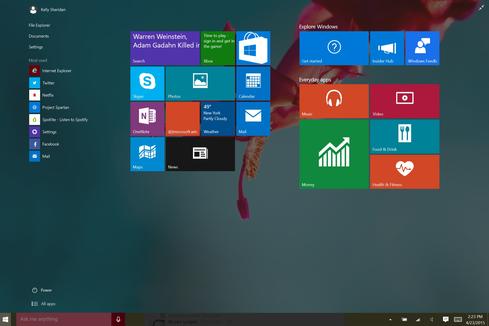Get Fast: A Survival Strategy For Software DevelopmentGet Fast: A Survival Strategy For Software Development
Speed is of the essence in a world where every company must be a software company.

Windows 10 Build 10061: App Revamps Galore
Windows 10 Build 10061: App Revamps Galore (Click image for larger view and slideshow.)
At the information Conference in Las Vegas on Tuesday, there wasn't much agreement about how to refer to legacy IT. Walmart CIO Karenann Terrell called it "classic," because the term was respectful. Andrew Zitney, SVP at Allstate's technology and operations infrastructure services organization, suggested "evergreen," to reflect the role of the traditional corporate IT portfolio as a foundation of revenue.
But Zitney and fellow panelists Andi Mann, VP of products, strategy, and marketing at CA Technologies, and Mike Beltzner, product lead for mobile and web apps at Pinterest, agreed that companies need to accelerate how they deliver software, without necessarily leaving legacy IT behind.
During a panel discussion that posed the question, Do You Have What It Really Takes To Be A Software Company?, Mann cited venture capitalist Marc Andreessen's widely touted view that "software is eating the world" and noted, "Every business is becoming a software business."
From that, one might conclude that if you don't have what it takes to be a software company, your company won't last.
To last, be first, or at least fast enough to keep up. Beltzner described how, a year and a half ago, Pinterest moved to a three-week development cycle for its mobile app. And now he said he hopes to reduce that cycle to two weeks. Looking ahead, he contended that continuous development will become the norm.
Audience members had their doubts, with one pointing out that continuous code delivery would present management and training problems within organizations. Mann's answer was to move away from static support documents and to design software better. "The goal for us is to make our software so usable, so easy, that we don't need manuals," he said.
The need for speed is partially driven by consumers. Everything is faster now, said Mann, noting how with mobile devices people don't have to wait for anything. Speed is about customer satisfaction, he said, but it's also about keeping ahead of the competition and security.
In order for organizations to adopt rapid development, Mann and Beltzner argued for standardized APIs and for continuous, automated, virtualized testing – you can't test software if the next release follows too quickly, so you must test as you develop.
[ Think you're ready for IoT? Think again: IoT And The Looming Mobile Tidal Wave. ]
"Everything's ripe for disruption," said Zitney, adding that even the staid insurance industry has noticed Google's decision to start selling auto insurance. "The insurance of the past is definitely not going to be the insurance of the future," he said. Tomorrow's insurance, Zitney suggested, will look at the way you drive your car, not just your age.
Such change requires data and software. Every company, if it isn't already, must become a software company, or so the panelists seemed to suggest.
"We're changing the whole methodology to how we develop," said Zitney.
Perhaps you've heard the term "agile" to describe an approach to software development. Zitney used the term "extreme agile." As software eats the world, even extreme agility may not be fast enough.
Interop Las Vegas, taking place April 27-May 1 at Mandalay Bay Resort, is the leading independent technology conference and expo series dedicated to providing technology professionals the unbiased information they need to thrive as new technologies transform the enterprise. IT Pros come to Interop to see the future of technology, the outlook for IT, and the possibilities of what it means to be in IT.
About the Author
You May Also Like






